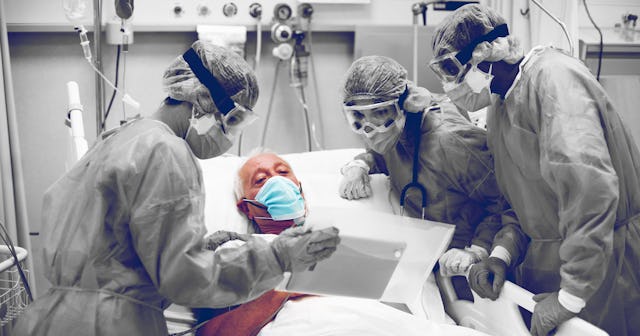Virtual Goodbyes—iPads In ICUs Have A Heartbreaking (And Important) Job

From meetings and doctors appointments to therapy sessions and Zoom weddings, most events are virtual these days. After all, with COVID rates on the rise, it’s safest to stay inside. But it’s not all fun, filters, and games. Earlier this week, Dr. Mark Shapiro — a hospitalist at Santa Rosa Memorial Hospital in California — shared the tragic and heartbreaking truth about “virtual goodbyes,” or goodbyes which take place over FaceTime or video.
“As the ICU team makes ready [the ventilator], there’s a key step we mustn’t forget,” Shapiro wrote on Twitter. “At first [the patient] says ‘No,’ but we encourage him. The nurse brings in the iPad. With the last air in his shattered lungs, he says goodbye to his family. Over an internet connection.”
Let me repeat that: The patient said goodbye virtually.
Over an internet connection.
Of course, news of these goodbyes isn’t really a surprise. Millions of Americans have contracted COVID-19 since March. 282,000 people have died, and countless others have been hospitalized, due to coronavirus and unrelated health conditions. What’s more, many hospitals are limiting and/or prohibiting visitors, as was the case when my mother died. COVID didn’t claim her life, nor did complications arising from the virus. Instead, a combination of alcoholism, mental illness, and heart failure did. But I couldn’t visit her. In the state of New Jersey, where she lived, hospitals were on lockdown, and — as such — there was no closure.
She was 65 and died alone.
And while I was able to speak with her for ten minutes, maybe 15, it wasn’t the same. Our call was uneventful. Trivial. There was no true goodbye.
Of course, I am not alone. Millions of individuals have been unable to say goodbye and/or forced to say goodbye virtually, including Amanda, a dance studio owner in Staten Island.
sam thomas/Getty
“I spoke to my father the day before, obviously not knowing that he was going to pass the next day,” Amanda tells Scary Mommy. “When we said goodbye, I remember specifically saying I’d call him tomorrow. He went from stable to not, overnight. I don’t know if it’s better or worse that I didn’t get to actually say ‘goodbye’ because our last conversation was somewhat normal and not me harping on the fact that I’d never see him again. But I’m bothered that he was alone in the hospital when all of this was happening. I wish that if I knew I was going to have to say goodbye, I could’ve been there. I could’ve seen him.”
And Nicole Early, a chemistry student at Drexel University, agrees.
“The image I have of my grandfather is strong, healthy, and always smiling, and I can’t say for sure that seeing him in the condition that he was in would have helped with healing,” Early explains. “I feel like it would probably weigh heavily on my mind. But I really yearned to hug him and tell him how much I love him and how thankful I was for everything he did for our family. If the circumstances were different… I would have wanted to see him. I would have been by his side.”
Shapiro’s story isn’t the only such story making waves. On Thursday, a photo of iPads being prepared for patients in the ICU began circulating on Twitter, and the image quickly went viral. To date, the post has been liked more than 121,000 times and shared more than 30,000.
In September, Houston Methodist Hospital became one of the first to offer a virtual ICU, with cameras in each room, and many families are holding FaceTime funerals. My mother’s viewing, for example, had a phone number and passcode. There was a Zoom link. And while technology is an amazing thing — it’s helping to bring families closer during this trying and difficult time — it shouldn’t have to be this way.
If people would wear their damn masks, socially distance, and stop hosting parties for Aunt Suzy and Uncle whats-his face, we could (and would) be further along.
But until that time, or until a vaccine is publicly available and enough of the population has been inoculated, this is where we are. After all, we are desperate for normalcy. For human connection. And virtual goodbyes are better than no goodbyes. They are something.
We are grateful that healthcare workers care enough to facilitate this. They are the real MVPs. The true heroes. But it doesn’t change the fact that virtual goodbyes are distressing. They are sad and heartbreaking and really fucking unfortunate, and it sucks that we can’t do better. It’s sad that we’ve come to this. Because life doesn’t happen over an internet connection. It really, really shouldn’t.
This article was originally published on